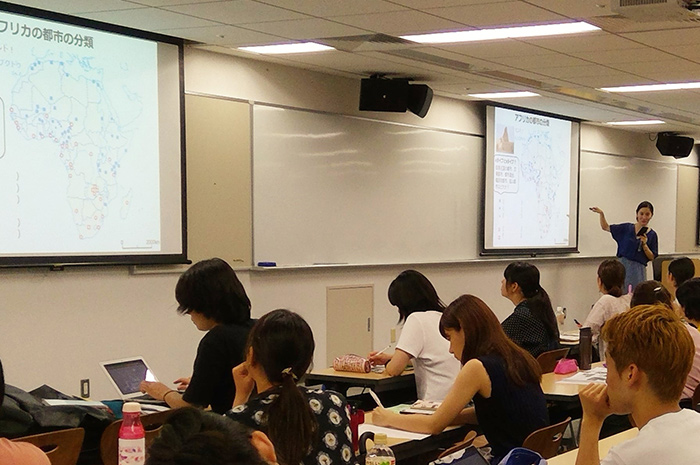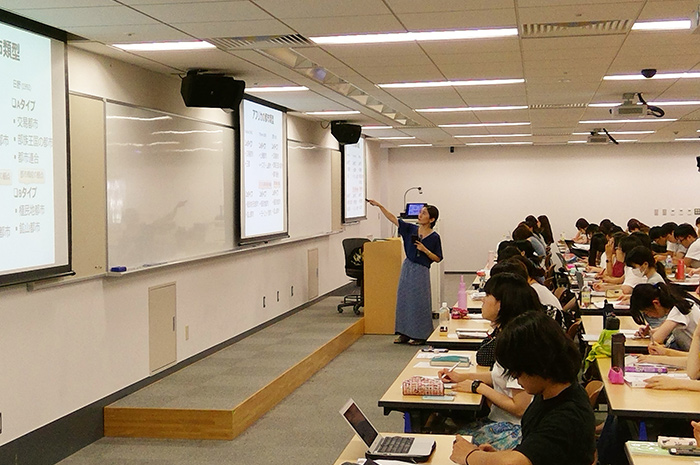Class Introduction:Overview of African Studies 1
What kind of subjects do FGS students usually take, and what do they learn?
This time, we introduce the course “Overview of African Studies 1” by Professor Mikako Toda.

Comment from Professor:
Do you know how many countries are in the African continent? Including the Sahrawi Arab Democratic Republic, which the Japanese government does not officially recognize, there are 55 countries. The scale of each country varies from island nations with less than one million people to vast countries with over 100 million people making it difficult to generalize about African countries. Accordingly, in this course, we first learn the basics of understanding the regional characteristics of Africa which possesses diverse ethnic groups, languages, and ecological environments. Next, while introducing African ethnographies, we will address cultural anthropology topics such as family, kinship organization, and witchcraft.
Cultural anthropology is the study of encountering, discovering, and exploring unknown others and different cultures. Ultimately, it also involves questioning ourselves and our own culture by asking, “Why are we like this?” There might be rational rules behind habits and lifestyles that seem peculiar to us. In the modern world where global discourses unfold on a global scale, there is significance and interest in examining from a local perspective.
After learning these basics, the aim is to understand current events in modern Africa, such as the impact of environmental and development policies on local residents’ lives, by introducing specific regional examples interspersed with perspectives from cultural anthropology.
Africa is undergoing rapid changes. The image of Africa in Japan has also significantly shifted from the past notions of “poverty, conflict, and AIDS” to more positive ones like “resources, growth, and potential”. I hope you will study Africa from the perspective of fellow humans living in the same era.

Class Interview
There are various aspects of Africa, such as ethnicity, history, tradition, culture, and
industry that we consider from the perspective of cultural anthropology in the course “Overview of African Studies”, and it is my favorite course! In class, Professor Toda uses PowerPoint, images, and videos to explain various aspects of Africa, such as the daily lives of people, cultural and traditional differences, and forms of family inheritance! The course specifically enables us to learn about Africa, which we would never come to know in the confined space of Japan (Tokyo), under the concept of “Dark Continent Africa”. I believe Africa, currently with a population exceeding 1.1 billion and continuously growing, is a fascinating continent filled with a rich history, a tragic colonial past, and being an economic powerhouse, along with infinite possibilities for future development. The reason I took an introductory course on African studies is because after deciding to attend Sophia University, I traveled alone to Tanzania in East Africa for about two weeks as a volunteer where I experienced culture shock. Have you ever seen the smiles of children living in Africa? Have you ever experienced killing a chicken right in front of you and eating it? How about seeing a real slum? Through these experiences in Africa, I chose to study this subject because I wanted to deepen my understanding of this region that is completely different from Japan. Why don't you also consider thinking about the African region, which is full of hope and possibility? (Takeaki Enomoto, First-year, Faculty of Global Studies)
As I was interested in Africa but did not have much prior knowledge, I wanted to take a course that could cover the entire area. Although the instructor is a cultural anthropologist, the classes were conducted on the themes of Africa's economy, politics, and globalization, and “coexistence” with each lesson being different making them very interesting. When studying African economy and politics, a historical background and cultural anthropological approach enable new approaches without being bound by existing perspectives. It was highly appropriate as an overview, and I would strongly recommend taking it to anyone interested, even if one does not have prior knowledge about Africa. (Daisuke Kuwabara, Third-year, Faculty of Global Studies)
